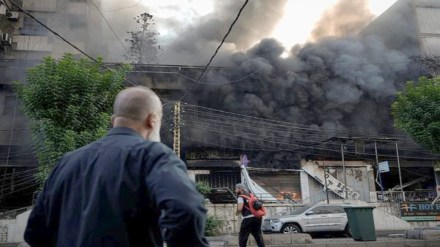An Israeli airstrike on a mosque in the Gaza Strip early Sunday morning resulted in the deaths of at least 19 people, according to Palestinian officials. This attack occurred as Israel ramped up its bombardment of both northern Gaza and southern Beirut, expanding its conflict with Iran-allied militant groups across the region.
Israel is currently engaged in a fierce battle against Hamas in Gaza, nearly a year after the militant group’s attack on October 7, which left 1,200 Israelis dead. In addition to the ongoing conflict in Gaza, Israel has opened a new front against Hezbollah in Lebanon, where clashes along the border have intensified since the onset of the Gaza war. Following a recent ballistic missile attack by Iran, Israel has vowed to retaliate against Iranian targets.
The latest strike in Gaza hit a mosque where displaced individuals were taking refuge near Al-Aqsa Martyrs Hospital in Deir al-Balah. Israel claimed it targeted a Hamas command centre located within civilian infrastructure but did not provide any evidence to support its assertion. An Associated Press journalist reported from the Al-Aqsa Martyrs Hospital morgue, where the bodies of the deceased, all men, were accounted for, along with reports of another man sustaining injuries.
In addition to the mosque strike, the Israeli military announced a new air and ground offensive in Jabaliya, a northern Gaza area known for its densely populated refugee camps established since the 1948 war. The military released images and videos showing tanks advancing toward Jabaliya, claiming that its forces had encircled the area. Israeli warplanes have been conducting airstrikes against militant positions in preparation for this advance, even though previous operations in the region have seen militants regroup after initial assaults.
As part of its strategy, Israel has also issued new evacuation orders for northern Gaza, which had largely emptied following previous calls for residents to flee south. Approximately 300,000 people are believed to remain in the region under increasingly dire conditions.
The Israeli military stated, “We are in a new phase of the war,” and warned that certain areas were now classified as combat zones. Israeli military spokesman Avichay Adraee stated that the so-called humanitarian zone in southern Gaza had been expanded, urging civilians to relocate there. This zone has been home to sprawling tent camps housing hundreds of thousands of displaced individuals. Despite its designation, Israel has carried out strikes within this zone, citing the presence of militants among civilians.
Witnesses and residents reported heavy bombardments throughout northern Gaza. The Civil Defense, operating under the Hamas-run government, reported significant destruction to homes and buildings, stating they were unable to respond due to ongoing airstrikes. Social media posts reflected the devastation, with one resident mourning the loss of family members in a recent airstrike.
The death toll in Gaza has surged to nearly 42,000, as reported by the Palestinian Health Ministry. The ministry does not distinguish between civilian and militant casualties, although a significant portion of the deceased includes women and children.
In Lebanon, Israeli airstrikes illuminated the night sky and reverberated through southern Beirut, specifically in the Dahiyeh suburbs, as Israel targeted sites linked to Hezbollah. Strikes were reported near the road leading to Lebanon’s only international airport and a building previously used by the Hezbollah-run Al-Manar broadcaster. Israel’s military confirmed the strikes, noting that around 30 projectiles had been launched from Lebanon toward Israeli territory, with some intercepted.
Hezbollah claimed to have successfully targeted Israeli soldiers in northern Israel with a significant rocket attack, though independent verification of such claims remains unconfirmed. The ongoing conflict has resulted in at least 1,400 Lebanese casualties, including civilians and Hezbollah fighters, and has displaced approximately 1.2 million people within Lebanon in less than two weeks.
The situation has escalated to the worst level of violence since the month-long war between Israel and Hezbollah in 2006. Following the recent assassination of Hezbollah leader Hassan Nasrallah and many of his top commanders, Israel initiated a limited ground operation in southern Lebanon, claiming to have killed approximately 440 Hezbollah fighters while suffering the loss of nine Israeli soldiers.
In a statement from Iran, Foreign Minister Abbas Araghchi indicated ongoing efforts to broker a ceasefire in both Gaza and Lebanon, citing discussions among Middle Eastern countries. Meanwhile, Iran’s supreme leader expressed support for missile strikes against Israel, promising further action if necessary.
Israeli Prime Minister Benjamin Netanyahu affirmed Israel’s right to defend itself and respond to attacks, indicating that operations in Lebanon were far from complete. As the conflict continues to escalate, concerns mount over its potential to draw in the United States and allied Arab nations, further complicating the already volatile situation in the region.
